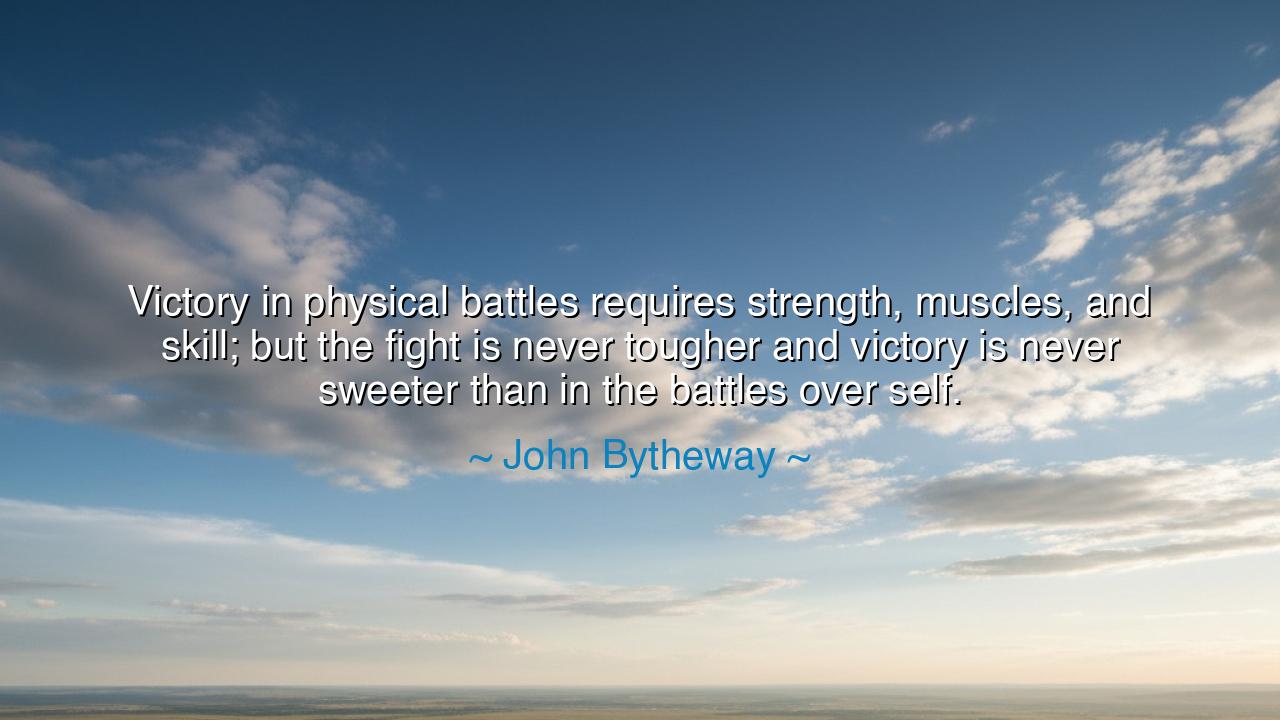
Victory in physical battles requires strength, muscles, and
Victory in physical battles requires strength, muscles, and skill; but the fight is never tougher and victory is never sweeter than in the battles over self.






The words of John Bytheway rise with the solemn gravity of eternal truth: “Victory in physical battles requires strength, muscles, and skill; but the fight is never tougher and victory is never sweeter than in the battles over self.” This is no fleeting thought, but a declaration as old as mankind’s struggles. For the ancients knew that while armies clash on fields of war and champions wrestle in arenas, the fiercest struggle rages not without, but within. To conquer another is great, but to conquer oneself is divine.
A physical battle can be seen, its foes named, its weapons drawn. You know the enemy before you, and your strength and skill are tested openly. But the battle over self is a war fought in silence, in hidden hours, in the chambers of the heart. The enemies are pride, anger, greed, fear, and temptation. These foes do not rest, and they strike not from without, but from within one’s very being. To wrestle them, to subdue them, to master them—this is the greatest and most demanding contest.
Consider the tale of Siddhartha Gautama, who became the Buddha. He abandoned wealth, throne, and comfort to fight a battle unseen: the cravings of desire, the chains of illusion, the storms of the mind. On that fateful night beneath the Bodhi tree, he was assailed not by swords or spears but by the armies of his own inner demons—fear, doubt, temptation. Yet he endured, unmoved, and in mastering self, he attained enlightenment. His victory was not over kingdoms, but over the restless depths of his own soul.
History speaks too of Marcus Aurelius, emperor of Rome. Though he commanded legions and ruled vast lands, his greatest struggle was within. In his Meditations, he confessed daily his fight against anger, vanity, and despair. He knew that the throne could not save him if he became a slave to his passions. His writings remind us that even emperors must learn to govern themselves before they can govern the world. His greatest strength was not his crown but his discipline of mind.
Bytheway’s words also echo in the lives of ordinary men and women. The addict who resists the bottle, the student who overcomes fear of failure, the parent who masters impatience—these are victories unseen by crowds but greater than any trophy. To subdue self, to master one’s weaknesses, is a triumph that no enemy can steal. The victory may not be celebrated with parades, but its sweetness is deeper, its glory eternal.
The lesson is clear: do not measure greatness only by battles fought with others. Seek first the conquest of your own soul. For what use is it to win a thousand wars if anger still rules your heart? What value is there in conquering kingdoms if greed and fear enslave your spirit? True kingship, true mastery, is found in the one who has subdued his own inner foes. This is the victory that endures when the dust of battle has long settled.
Practical action lies before you. Begin by naming your inner enemies. Write them down: anger, pride, fear, laziness, envy—whatever haunts your heart. Then, like a warrior in training, practice small acts of resistance. If anger strikes, choose silence. If fear whispers, take one brave step. If sloth tempts, rise and act. These small battles, fought daily, will forge the iron of your character. Each act of mastery builds a fortress within, until you stand unshaken no matter the storm.
So let John Bytheway’s words be a torch upon your path: victory in the world is fleeting, but victory over self is eternal. Muscles weaken, kingdoms crumble, armies fall—but the soul that has conquered itself stands unconquerable. Seek that greater battle, fight it with courage, and when you win, the sweetness of that triumph will surpass every other crown.






AAdministratorAdministrator
Welcome, honored guests. Please leave a comment, we will respond soon